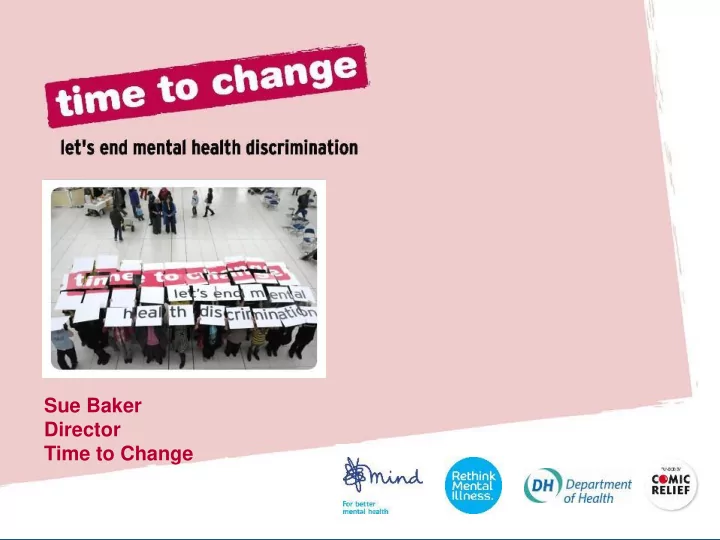

Sue Baker Director Time to Change
Why Focus on Stigma and Discrimination? 58% of people said that stigma and discrimination are as damaging or more damaging than the symptoms of their mental health problem (*1) 27 % said stigma had made them want to give up on life 9 out of 10 people using secondary mental health services report discrimination (*2 ) (*1) 2014 survey of 5,000 TTC supporters (*2) Viewpoint survey2008 and 2012 (Institute of Psychiatry)
Why Focus on Stigma and Discrimination? Stigma and discrimination affect all areas of life The top five life areas were: • Friendships and social life - 55% • Workplace - 54% • Family life - 51% • Dating and relationships - 33% • Health services - 32% 28% waited more than a year to tell their family 22% waited more than a year to talk to their GP
Mental Health in the NHS Workforce MH will affect 1 in 6 British workers each year (ONS) Boorman Review interim report: 25% of NHS sickness absence was due to stress, depression and anxiety. The real reason for absence may not be disclosed due to fear of discrimination so levels of MH absence often under-estimated. Costs are not just absenteeism but presenteeism . Boorman review: presenteeism greater for those who work long hours and experience managerial pressure to return to work. 71% of qualified nurses and midwives aged 21-30 reported presenteeism compared to 45% in corporate services.
NHS Staff and Mental Health Disclosure “ I ’ m an NHS mental health nurse who has bipolar. My manager is aware of my diagnosis but the general culture in my workplace - and in nursing in general - is that it's 'better to keep quiet'. When I became ill my manager was against me even seeing a psychiatrist, as due to geographical restrictions it would have been one who works with our team….”
Work with Employers Organisational pledge The Time to Change pledge is a public statement of commitment supported by concrete action. 15% of pledged employers report increased staff disclosure
The movement of 150 organisations across a wide range of sectors
Organisational pledges in the Health Sector NHS Employers Public Health England NHS Confederation Department of Health CCGs Mental Health Trusts
Stigma and Discrimination when Providing NHS Services In additional to a lack of disclosure in the workplace, people with mental health problems using NHS services report experiencing discrimination: Staff: Attitudes and behaviour Lack of dignity and respect Culture: ‘Them and Us’ (ie MH not a issue for the NHS workforce) Leadership: Lack of lived experience leadership (all levels) Services: Lack of a recovery focused model Timely access & appropriate choice of services
Life Area 2008 2011 Direction of Z score, after P after Significant after weighting (df) weighting 1 % reporting % reporting change 2008- correction for discrimination discrimination 2011 multiple testing ↓ Being Shunned 57.9 50 -2.94(3,1) <0.01 ↓ Friends 53.3 39.4 -5.04 (3,1) <0.01 ↓ Family 53.1 43.7 -3.23 (3,1) <0.01 ↓ Social Life 43.2 31.5 -3.52 (3,1) <0.001 ↓ Neighbours 25.3 22.7 0.53 (3,1) 0.60 N/A ↓ Mental Health Staff 34.3 30.4 -1.11 (3,1) 0.27 N/A ↓ Dating 30.9 22.1 -2.13 (3,1) 0.03 NS ↓ Physical health 29.6 28.9 -0.08 (3,1) 0.94 N/A ↓ Find Job 24.2 18.6 -1.92 (3,1) 0.05 N/A ↓ Privacy 21.6 20.0 -1.15 (3,1) 0.25 N/A ↑ Safety 19.6 24.8 0.21 (3,1) 0.84 N/A ↑ Benefits 19.0 24.9 2.16 (3,1) 0.03 NS ↓ Parenting 18.6 15.6 -0.88 (3,1) 0.38 N/A ↓ Keep Job 16.9 16.6 -0.99(3,1) 0.32 N/A ↓ Police 16.4 16.1 -0.21 (3,1) 0.83 N/A ↓ Housing 14.7 13.3 0.20 (3,1) 0.84 N/A ↓ Education 12.3 10.2 -0.76 (3,1) 0.45 N/A ↑ Marriage 12.1 17.3 1.34 (3,1) 0.18 N/A ↑ Transport 11.4 12.0 1.09 (3,1) 0.27 N/A ↓ Starting a family 10.8 6.9 -1.45(3,1) 0.15 N/A ↓ Religious Activities 10.1 4.3 -2.52(3,1) <0. 01 NS
Top 10 discrimination life areas 2008 and 2011 2008 2011 1 Being shunned (57.9%) 1 Being shunned (50%) (-7.9%) Signif 2= Friends (53.3%) 2 Family (43.7%) (-9.6%) Signif 2= Family (53.1%) 3 Friends (39.4%) (-13.7%) Signif 4 Social life (43.2%) 4 Social life (31.5%) (-11.7%) Signif 5 Mental health staff (34.3%) 5 Mental health staff (30.4%) (-3.9%) 6 Dating (30.9%) 6 Physical health staff (28.9%) (-0.7%) 7 Physical health staff (29.6%) 7 Benefits (24.9%) (+5.9%) 8 Neighbours (25.3%) 8 Safety (24.8%) (+5.2%) 9 Finding a job (24.2%) 9 Neighbours (22.7) (-2.6%) 10 Privacy (21.6%) 10 Dating (22.1%) (-8.8%)
2009-2010 Mental health stigma & discrimination on the agenda Creating a national space for discussion Providing information to address gaps in knowledge
It’s odd, but people I’m Asian and gay. I Manager found my cancer Dad experience easier to deal with Bipolar discrimination than my depression every day, but not for the reasons you’re thinking.
2013: Starting conversations “@TimetoChange Guess what?! A friend of mine talked to me about #mentalillness for the first time today thanks to your latest ad. #whatstigma”
Impact 2007-2012 • Attitudes have improved between 2008 and 2012 (for the first time in England). Significant 3.6% attitude improvement for all adults and higher for the millions who are campaign-aware. Continued improvements throughout the recession. • Having social contact and being campaign-aware are the strongest predictors of having more positive attitudes. • We’ve got people talking more openly. Very significant increase in people saying they know someone with a mental illness (48% in 2008 up to 62% in 2011). • We’ve evidenced decreases in discrimination particularly from family, friends, social life and people feeling “shunned”. Evaluation of the first phase of Time to Change (2007-2011) by the Institute of Psychiatry, King’s College London, was published in a special supplement (British Journal of Psychiatry April 2013)
Recommend
More recommend